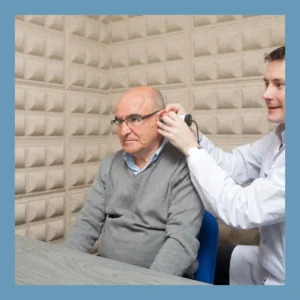Connecting the Dots Between Tinnitus and Dementia
Tinnitus and dementia may seem unrelated, but research reveals surprising connections. Understanding these links can help manage and prevent these conditions more effectively.
Understanding Tinnitus and Dementia
Tinnitus is a condition causing unexplained ringing, buzzing, or roaring sounds in the ears. These sounds, known as phantom noises, can be constant or intermittent and vary in intensity. Tinnitus affects about 10% to 25% of U.S. adults and can significantly impact daily life.
Dementia is a progressive disorder that impairs memory, thinking, and behavior. It includes conditions like Alzheimer’s disease and vascular dementia. Dementia profoundly impacts both individuals and their loved ones, making early detection and management essential.
How the Auditory System Connects to Cognitive Function
The auditory system is vital for processing sounds and helping us understand our environment. It involves complex neural pathways that connect to various brain regions responsible for memory, attention, and cognition. Research indicates that tinnitus and dementia share common neurological pathways. Both conditions involve disruptions in neural synchrony and structural changes in brain regions like the hippocampus, amygdala, and prefrontal cortex. These areas are crucial for memory, emotion, and cognitive function.
Studies and Research Findings
-
2021 Retrospective Study:
This significant study found that adults with existing tinnitus were 68% more likely to develop early-onset dementia. This included adults under 65, marking the first study to define a potential link between these two conditions. The findings suggested that tinnitus could be an early indicator of cognitive decline, emphasizing the importance of monitoring tinnitus patients for early signs of dementia.
-
Cognitive Impairment in Tinnitus Patients:
Various studies have shown that cognitive impairments are common among tinnitus patients. Mild cognitive impairments (MCI), which often precede clinically evident dementia, are frequently reported. Severe tinnitus patients are at higher risk of significant cognitive deficits, indicating that the severity of tinnitus could correlate with the degree of cognitive impairment.
-
Neurological Changes:
Neuroimaging studies have revealed that tinnitus is associated with structural and functional changes in cognition-related brain areas. In particular, disruptions in these areas are linked to both tinnitus and cognitive impairments, suggesting shared pathophysiological mechanisms.
-
Brain Areas Included:
- Ventromedial Prefrontal Cortex: Changes in this area are involved in emotional regulation and decision-making, often affecting dementia.
- Parietal Cortex: This region is crucial for sensory perception and integration, both of which can be disrupted in dementia and are affected by tinnitus.
- Anterior Cingulate Cortex: Known for its role in cognitive control and emotional regulation, disruptions here are linked to both conditions.
- Hippocampus and Amygdala: Imaging studies have shown pathological changes in the hippocampus and amygdala in both tinnitus and dementia patients. These areas are essential for memory and emotional responses, respectively. The observed changes include atrophy and the accumulation of abnormal protein aggregates, similar to those found in Alzheimer’s disease.
- Prefrontal Cortex: Tinnitus patients often exhibit changes in the prefrontal cortex, a key area for higher cognitive functions such as planning and decision-making. These changes are also seen in the early stages of dementia, reinforcing the potential link between the two conditions.
- Proteinopathy: Autopsy studies have found proteinopathy or abnormal protein accumulation in the brains of tinnitus patients with normal cognitive function before death. This suggests a shared neuronal pathology between tinnitus and dementia, supporting the hypothesis that tinnitus might precede or occur alongside early-onset dementia.
- Other Brain Regions: Studies also show nucleus accumbens, insula, and thalamus changes. These areas are involved in various cognitive and sensory processes, and their involvement further underscores the complex relationship between tinnitus and dementia.
These findings collectively suggest that tinnitus and dementia may share underlying neurological mechanisms. This connection highlights the need for comprehensive approaches in diagnosing and treating patients with tinnitus, considering their potential risk for cognitive decline. By understanding the intricate relationship between tinnitus and dementia, healthcare professionals can better address the needs of patients, aiming for improved outcomes and quality of life.
Is Tinnitus an Early Warning Sign?
Research suggests that tinnitus might be an early indicator of cognitive decline. Understanding this connection can help in early detection and intervention for both conditions.
Cognitive Decline and Tinnitus
A 2024 review and meta-analysis found that tinnitus-related cognitive effects are more pronounced in adults over 60. Complications include:
- Dementia
- Reduced auditory attention
- Poor sleep/insomnia
- Depression
- Anxiety
Seventeen studies revealed a strong association between tinnitus and an elevated risk of dementia. The analysis showed that adults over 60 experience more significant cognitive impairments compared to younger adults. The review confirmed that cognitive decline symptoms in tinnitus patients are more pronounced in older adults. This suggests that age significantly affects the severity of cognitive impairments linked to tinnitus.
Johns Hopkins Study
Research from Johns Hopkins Medical Center found that elderly individuals with hearing loss had a significantly higher risk of developing dementia. The risk increases with the severity of the hearing loss. Tinnitus prevalence is higher in people with dementia. Those with Alzheimer’s disease tend to have worse tinnitus than those without the condition.
Risk Factors Linking Hearing Loss and Dementia
- Social Isolation: Hearing loss often leads to withdrawal from social situations, increasing the risk of dementia.
- Cerebral Atrophy: Hearing impairment accelerates brain atrophy in areas involved in memory, hearing, speech, and language.
- Cognitive Overload: Untreated hearing loss forces the brain to work harder to fill in conversation gaps, increasing cognitive load and dementia risk.
- Sleep Disruption: Tinnitus can make falling or staying asleep challenging, leading to sleep disturbances.
- Increased Stress and Anxiety: The constant noise perception can heighten stress and anxiety levels, impacting cognitive performance.
- Reduced Quality of Life: Tinnitus-related distress can reduce overall well-being, potentially affecting cognitive health.

Managing Tinnitus for Cognitive Health
Addressing tinnitus-related distress is essential for overall cognitive well-being. Here are some strategies:
- Reducing Social Isolation: Active aging involves optimizing opportunities for better health, continuous development, and increased security. Maintaining social, physical, economic, spiritual, and civic engagement helps reduce the risk of cognitive decline and dementia.
- Counseling and Cognitive Behavioral Therapy: Tinnitus counseling and cognitive behavioral therapy (CBT) can help develop coping strategies to reduce distress.
- Sound Therapy: Background noise or soothing sounds can mask tinnitus and improve sleep quality.
- Lifestyle Modifications: Regular exercise, a balanced diet, and stress management techniques contribute to better overall cognitive health.
Comprehensive assessments and appropriate interventions are crucial for individuals experiencing hearing loss or tinnitus.
Find out about the connection between hearing loss and exercise.
Managing Dementia and Tinnitus Together
Living with both dementia and tinnitus presents unique challenges, but effective strategies can help.
- Creating a Calming Environment: Minimize background noise and create a quiet space to reduce sensory overload. A peaceful environment helps manage symptoms of both conditions.
- Communication Techniques: Use visual aids, simplify language, and maintain patience when communicating. Effective communication reduces frustration and improves relationships.
- Caregiver Support: Caregivers should prioritize self-care, join support groups, and seek professional help when needed. Support for caregivers is vital in managing the challenges of caring for someone with both conditions.
The Role of Hearing Aids
Hearing aids can help mask tinnitus, reducing its perception and making everyday sounds clearer. Addressing hearing loss with hearing aids can reduce dementia risk. Improved auditory function and reduced social isolation are key benefits. Regular hearing checks for people with dementia help monitor hearing health and identify potential changes. Early detection and intervention can significantly improve outcomes.
Find the best hearing aids for tinnitus.

Be Proactive, Not Reactive
While there is a link between tinnitus and dementia, it doesn’t guarantee that one will lead to the other. Early detection and intervention can significantly improve quality of life.
If you experience tinnitus or have concerns about cognitive decline, contact Stanford Hearing for help and guidance. Taking proactive steps can enhance your hearing and cognitive well-being.
